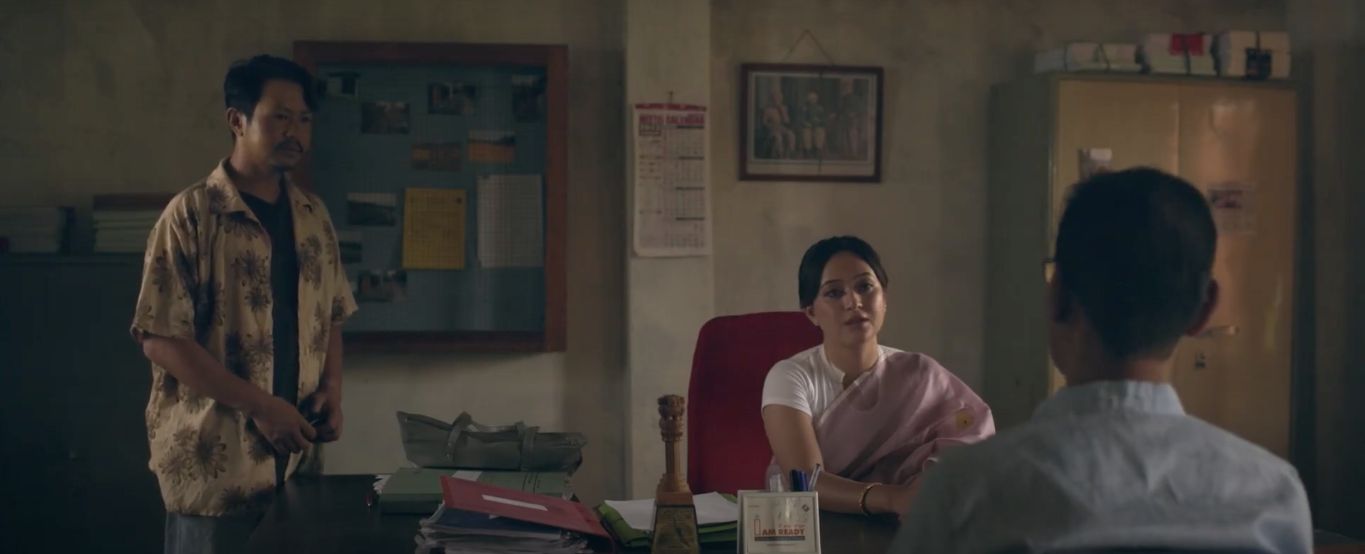Lembi Leima Leads the Way for Manipuri Short Films
Written by – Dr. Johnson Rajkumar
Even though Manipur boasts a successful and well-known feature film history, short films remain a relatively unexplored territory. While feature films dominate Manipur’s cinematic landscape, few short films are quietly carving a niche, offering a fresh perspective and a platform for experimentations. Contrary to popular opinions, short films are not merely condensed versions of feature-length films but a distinct cinematic form. Traditionally, filmmaking has been dominated by large studios prioritizing feature films for their commercial viability. These films, free from the financial constraints of mainstream cinema, have become a cinematic form for experimentation. Lembi Leima, directed by Mayank Pratap Singh, is one such short film that has garnered acclaim for its thought-provoking narrative and impactful storytelling. With lead performances by Bala Hijam and Bijou Thangjam, the film explores themes of environmental exploitation, societal corruption, and the resilience of women against patriarchal norms, making it both timely and timeless.


At its heart, Lembi Leima is a reflection on the growing menace of palm tree plantations, a global concern with significant ecological and socio-economic implications. The story unfolds in a rural Manipuri village, where Taibungo, the village head, convinces the locals in consenting for palm plantation in their lands under the guise of government subsidies. What follows is a tale of deceit and greed, where the fertile soil of the land and the moral fabric of society are both eroded. The narrative’s central conflict arises when Bala (played by herself), a pregnant government officer, arrives to assess the land’s viability for palm tree cultivation. Her scientific findings about the future ecological ramifications clash with Taibungo’s exploitative ambitions, setting the stage for a larger battle between ecological wisdom and capitalist greed.
The issue of palm tree plantation depicted in the film resonates far beyond the borders of the village. These plantations, emblematic of unsustainable agricultural practices, not only deplete soil fertility but also disrupt local ecosystems and contribute to climate change. Lembi Leima addresses this universal concern by localizing it, urging viewers to reflect on the consequences of such development policies that prioritize profit over sustainability. The narrative becomes a microcosm of the global struggle against environmental degradation, encapsulating the tension between scientific knowledge systems and modern exploitative practices.
Amidst this, the film vividly shows the pervasive corruption that fuels such exploitation. Taibungo’s character is a chilling embodiment of the corrupt leader, manipulating both the system and his community for personal gain. His alliance with Nando (played by Bijou), a young villager under his influence and the other men, highlights how the uneducated and vulnerable are often co-opted into perpetuating cycles of exploitation. The villagers, driven by ignorance and fear, become complicit in this corruption, turning against Bala when they brand her as a witch. This age-old tactic of using superstition to silence dissenting women is a sharp critique of patriarchal systems and social prejudices, making the film’s effort all the more resonant.
The symbolism in the film enriches its storytelling, with umbrellas as a key motif that subtly foreshadows the characters’ intentions. In an early scene, Taibungo’s men are shown holding a black umbrella for him, a representation of corruption and moral decay. In contrast, when Bala is introduced, Nando carries a white umbrella for her, symbolizing her role as a beacon of truth and hope. These carefully crafted visual cues not only enhance the narrative but also provide a layered subtext, reinforcing the film’s thematic contrasts between exploitation and integrity.
As the narrative unfolds, Bala’s character undergoes a transformation that elevates her to a near-mythical status. Her pregnancy, a recurring motif, symbolizes creation and renewal. Despite her vulnerability, she emerges as a figure of strength and moral clarity, embodying the resilience needed to confront entrenched systems of oppression. In the film’s climax, she gives birth which becomes a powerful metaphor for the birth of a new consciousness, that challenges patriarchal norms and envisions a more hopeful world. Her refuge in a mystical cave further reinforces this transformation, evoking the idea of the divine feminine.
The film, however, is not without its missed opportunities. In a night scene, when Bala is sitting with Nando on the guest house porch, she remarks on the village’s clean air compared to the city. This fleeting observation could have been expanded into a broader critique of urbanization and its systemic failures, adding another layer to the film’s engagement with environmental discourse. Nonetheless, the narrative remains impactful by balancing its critique of corruption and environmental exploitation with moments of quiet introspection and hope.

What sets Lembi Leima apart is its ability to humanize complex issues, making them accessible without diluting their gravity. The film is not a mere good and evil narrative but offers a nuanced portrayal of societal as well as individual struggles. Bala’s survival is not just a personal one; it is a communal awakening. This denouement does not shy away from the complexities it addresses, making the film a compelling watch.
On the technical front, the cinematography captures the rich, earthy tones of Manipur’s rural landscape, immersing viewers in its natural beauty. The carefully designed ambient soundscape anchors the story in a setting that feels both authentic and evocative. The deliberate pacing and measured performances lend the film a quiet intensity, enabling its themes to emerge naturally and with emotional depth. The art direction deserves recognition, especially in the detailed portrayal of the guest house mise-en-scene, which enriches the film’s visual narrative.
In the broader context of Manipuri cinema, Lembi Leima is a noteworthy addition that explores the potential of the short-film form to tackle issues with depth. Produced by Cicada Productions and RJ Star Productions, the film exemplifies how short films can serve as powerful tools for advocacy and reflection, pushing the boundaries of what cinema can achieve.
Through its narrative and symbolism, the film highlights the power of visual storytelling. It not only critiques systems of greed and oppression but also elevates the role of women as agents of change and protectors of the environment. In its quiet yet resolute voice, the film offers a vision of hope, urging viewers to imagine a more sustainable world. As Lembi Leima continues to get acclaimed in film festivals, it serves as a reminder of the untapped possibilities of Manipur’s short film landscape.
(Dr. Johnson Rajkumar is a Guest Faculty in Department of Mass Communication, Manipur University. He is also a film conservator and an archivist)

